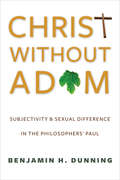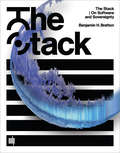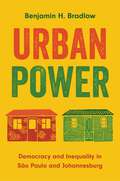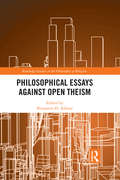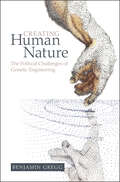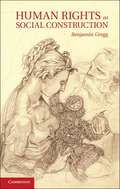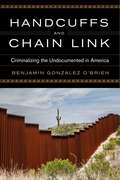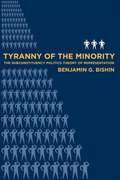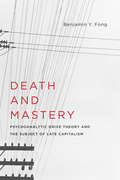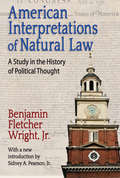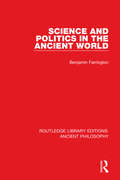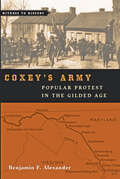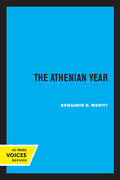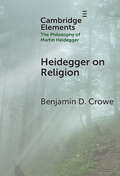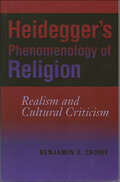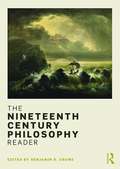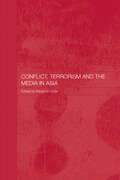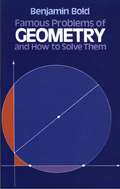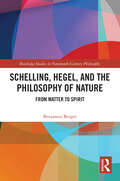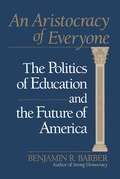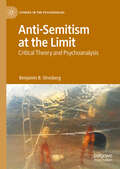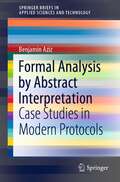- Table View
- List View
Christ Without Adam
by Benjamin H. DunningThe apostle Paul deals extensively with gender, embodiment, and desire in his authentic letters, yet many of the contemporary philosophers interested in his work downplay these aspects of his thought. Christ Without Adam is the first book to examine the role of gender and sexuality in the turn to the apostle Paul in recent Continental philosophy. It builds a constructive proposal for embodied Christian theological anthropology in conversation with -- and in contrast to -- the "Paulinisms" of Stanislas Breton, Alain Badiou, and Slavoj ?i?ek.Paul's letters bequeathed a crucial anthropological aporia to the history of Christian thought, insofar as the apostle sought to situate embodied human beings typologically with reference to Adam and Christ, but failed to work out the place of sexual difference within this classification. As a result, the space between Adam and Christ has functioned historically as a conceptual and temporal interval in which Christian anthropology poses and re-poses theological dilemmas of embodied difference. This study follows the ways in which the appropriations of Paul by Breton, Badiou, and ?i?ek have either sidestepped or collapsed this interval, a crucial component in their articulations of a universal Pauline subject. As a result, sexual difference fails to materialize in their readings as a problem with any explicit force. Against these readings, Dunning asserts the importance of the Pauline Adam--Christ typology, not as a straightforward resource but as a witness to a certain necessary failure -- the failure of the Christian tradition to resolve embodied difference without remainder. This failure, he argues, is constructive in that it reveals the instability of sexual difference, both masculine and feminine, within an anthropological paradigm that claims to be universal yet is still predicated on male bodies.
The Stack: On Software and Sovereignty (Software Studies)
by Benjamin H. BrattonA comprehensive political and design theory of planetary-scale computation proposing that The Stack—an accidental megastructure—is both a technological apparatus and a model for a new geopolitical architecture. What has planetary-scale computation done to our geopolitical realities? It takes different forms at different scales—from energy and mineral sourcing and subterranean cloud infrastructure to urban software and massive universal addressing systems; from interfaces drawn by the augmentation of the hand and eye to users identified by self—quantification and the arrival of legions of sensors, algorithms, and robots. Together, how do these distort and deform modern political geographies and produce new territories in their own image? In The Stack, Benjamin Bratton proposes that these different genres of computation—smart grids, cloud platforms, mobile apps, smart cities, the Internet of Things, automation—can be seen not as so many species evolving on their own, but as forming a coherent whole: an accidental megastructure called The Stack that is both a computational apparatus and a new governing architecture. We are inside The Stack and it is inside of us. In an account that is both theoretical and technical, drawing on political philosophy, architectural theory, and software studies, Bratton explores six layers of The Stack: Earth, Cloud, City, Address, Interface, User. Each is mapped on its own terms and understood as a component within the larger whole built from hard and soft systems intermingling—not only computational forms but also social, human, and physical forces. This model, informed by the logic of the multilayered structure of protocol “stacks,” in which network technologies operate within a modular and vertical order, offers a comprehensive image of our emerging infrastructure and a platform for its ongoing reinvention. The Stack is an interdisciplinary design brief for a new geopolitics that works with and for planetary-scale computation. Interweaving the continental, urban, and perceptual scales, it shows how we can better build, dwell within, communicate with, and govern our worlds.thestack.org
Urban Power: Democracy and Inequality in São Paulo and Johannesburg (Princeton Studies in Global and Comparative Sociology)
by Benjamin H. BradlowWhy some cities are more effective than others at reducing inequalities in the built environmentFor the first time in history, most people live in cities. One in seven are living in slums, the most excluded parts of cities, in which the basics of urban life—including adequate housing, accessible sanitation, and reliable transportation—are largely unavailable. Why are some cities more successful than others in reducing inequalities in the built environment? In Urban Power, Benjamin Bradlow explores this question, examining the effectiveness of urban governance in two &“megacities&” in young democracies: São Paulo, Brazil, and Johannesburg, South Africa. Both cities came out of periods of authoritarian rule with similarly high inequalities and similar policy priorities to lower them. And yet São Paulo has been far more successful than Johannesburg in improving access to basic urban goods.Bradlow examines the relationships between local government bureaucracies and urban social movements that have shaped these outcomes. Drawing on sixteen months of fieldwork in both cities, including interviews with informants from government agencies, political leadership, social movements, private developers, bus companies, and water and sanitation companies, Bradlow details the political and professional conflicts between and within movements, governments, private corporations, and political parties. He proposes a bold theoretical approach for a new global urban sociology that focuses on variations in the coordination of local governing power, arguing that the concepts of &“embeddedness&” and &“cohesion&” explain processes of change that bridge external social mobilization and the internal coordinating capacity of local government to implement policy changes.
Philosophical Essays Against Open Theism (Routledge Studies in the Philosophy of Religion)
by Benjamin H. ArbourThis new collection of philosophically rigorous essays critiques the interpretation of divine omniscience known as open theism, focusing primarily on philosophically motivated open theism and positing arguments that reject divine knowledge of future contingents in the face of the dilemma of freedom and foreknowledge. The sixteen new essays in this collection, written by some of the most renowned philosophers on the topic of divine providence, represent a philosophical attempt to seriously consider open theism. They cover a wide variety of issues, including: the ontology of time, systematic metaphysics, perfect being theology, the Christian doctrine of the Incarnation, the problem of evil, and the nature of divine knowledge in general. Philosophical Essays Against Open Theism advances the discussion by wrestling against the assertions of open theism, and will be of interest to both proponents and opponents of this controversial issue.
Continental Drift
by Benjamin Grob-FitzgibbonIn the aftermath of the Second World War, Churchill sought to lead Europe into an integrated union, but just over seventy years later, Britain is poised to vote on leaving the EU. Benjamin Grob-Fitzgibbon here recounts the fascinating history of Britain's uneasy relationship with the European continent since the end of the war. He shows how British views of the United Kingdom's place within Europe cannot be understood outside of the context of decolonization, the Cold War, and the Anglo-American relationship. At the end of the Second World War, Britons viewed themselves both as the leaders of a great empire and as the natural centre of Europe. With the decline of the British Empire and the formation of the European Economic Community, however, Britons developed a Euroscepticism that was inseparable from a post-imperial nostalgia. Britain had evolved from an island of imperial Europeans to one of post-imperial Eurosceptics.
Creating Human Nature: The Political Challenges of Genetic Engineering
by Benjamin GreggHuman genetic enhancement, examined from the standpoint of the new field of political bioethics, displaces the age-old question of truth: What is human nature? This book displaces that question with another: What kind of human nature should humans want to create for themselves? To answer that question, this book answers two others: What constraints should limit the applications of rapidly developing biotechnologies? What could possibly form the basis for corresponding public policy in a democratic society? Benjamin Gregg focuses on the distinctly political dimensions of human nature, where politics refers to competition among competing values on which to base public policy, legislation, and political culture. This book offers citizens of democratic communities a broad perspective on how they together might best approach urgent questions of how to deal with the socially and morally challenging potential for human genetic engineering.
Human Rights as Social Construction
by Benjamin GreggMost conceptions of human rights rely on metaphysical or theological assumptions that construe them as possible only as something imposed from outside existing communities. Most people, in other words, presume that human rights come from nature, God or the United Nations. This book argues that reliance on such putative sources actually undermines human rights. Benjamin Gregg envisions an alternative; he sees human rights as locally developed, freely embraced and indigenously valid. Human rights, he posits, can be created by the average, ordinary people to whom they are addressed and that they are valid only if embraced by those to whom they would apply. To view human rights in this manner is to increase the chances and opportunities that more people across the globe will come to embrace them.
Handcuffs and Chain Link: Criminalizing the Undocumented in America (Race, Ethnicity, and Politics)
by Benjamin Gonzalez O'BrienHandcuffs and Chain Link enters the immigration debate by addressing one of its most controversial aspects: the criminalization both of extralegal immigration to the United States and of immigrants themselves in popular and political discourse. Looking at the factors that led up to criminalization, Benjamin Gonzalez O’Brien points to the alternative approach of the Immigration Reform and Control Act of 1986 and how its ultimate demise served to negatively reinforce the fictitious association of extralegal immigrants with criminality. Crucial to Gonzalez O’Brien’s account thus is the concept of the critical policy failure—a piece of legislation that attempts a radically different approach to a major issue but has shortcomings that ultimately further entrench the approach it was designed to supplant. The IRCA was just such a piece of legislation. It highlighted the contributions of the undocumented and offered amnesty to some while attempting to stem the flow of extralegal immigration by holding employers accountable for hiring the undocumented. The failure of this effort at decriminalization prompted a return to criminalization with a vengeance, leading to the stalemate on immigration policy that persists to this day.
Tyranny of the Minority: The Subconstituency Politics Theory of Representation
by Benjamin G. BishinWhy do politicians frequently heed the preferences of small groups of citizens over those of the majority? Breaking new theoretical ground, Benjamin Bishin explains how the desires of small groups, which he calls "subconstituencies," often trump the preferences of much larger groups. Demonstrating the wide applicability of his "unified theory of representation," Bishin traces politicians' behavior in connection with a wide range of issues, including the Cuban trade embargo, the extension of hate-crimes legislation to protect gay men and lesbians, the renewal of the assault-weapons ban, and abortion politics. In the process, he offers a unique explanation of when, why, and how special interests dominate American national politics.
Death and Mastery: Psychoanalytic Drive Theory and the Subject of Late Capitalism (New Directions in Critical Theory #61)
by Benjamin FongThe first philosophers of the Frankfurt School famously turned to the psychoanalytic theories of Sigmund Freud to supplement their Marxist analyses of ideological subjectification. Since the collapse of their proposed "marriage of Marx and Freud," psychology and social theory have grown apart to the impoverishment of both. Returning to this union, Benjamin Y. Fong reconstructs the psychoanalytic "foundation stone" of critical theory in an effort to once again think together the possibility of psychic and social transformation. Drawing on the work of Hans Loewald and Jacques Lacan, Fong complicates the famous antagonism between Eros and the death drive in reference to a third term: the woefully undertheorized drive to mastery. Rejuvenating Freudian metapsychology through the lens of this pivotal concept, he then provides fresh perspective on Theodor Adorno, Max Horkheimer, and Herbert Marcuse's critiques of psychic life under the influence of modern cultural and technological change. The result is a novel vision of critical theory that rearticulates the nature of subjection in late capitalism and renews an old project of resistance.
American Interpretations of Natural Law: A Study in the History of Political Thought (Library Of Liberal Thought Ser.)
by Benjamin Fletcher WrightThis book illustrates the deep roots of natural law doctrines in America's political culture. Originally published in 1931, the volume shows that American interpretations of natural law go to the philosophical heart of the American regime. The Declaration of Independence is the preeminent example of natural law in American political thought�it is the self-evident truth of American society.Benjamin Wright proposes that the decline of natural law as a guiding factor in American political behaviour is inevitable as America's democracy matures and broadens. What Wright also chronicled, inadvertently, was how the progressive critique of natural law has opened a rift between and among some of the ruling elites and large numbers of Americans who continue to accept it. Progressive elites who reject natural law do not share the same political culture as many of their fellow citizens.Wright's work is important because, as Leo Strauss and others have observed, the decline of natural law is a development that has not had a happy ending in other societies in the twentieth century. There is no reason to believe it will be different in the United States.
Science and Politics in the Ancient World (Routledge Library Editions: Ancient Philosophy #2)
by Benjamin FarringtonThis book, originally published in 1965, discusses the political implication of the spread of science in antiquity. It reveals how the real Greek spirit of scientific research was crushed by Plato and Aristotle, long thought-of as searchers for truth. Historian such as Polybius and Livey and the poets Pinder and Virgil are seen in a new light when set against this background of social struggle.
Coxey's Army: Popular Protest in the Gilded Age (Witness to History)
by Benjamin F. AlexanderA colorful study of the nineteenth century march on Washington, the man who led it, and the national sensation that prefigured the New Deal.In 1893, America was suffering a serious economic depression. Fed up with government inactivity, Populist agitator Jacob S. Coxey led hundreds of unemployed laborers on a march from Massillon, Ohio, to Washington, D.C. Their intention was to present a “petition in boots” for government-financed jobs building and repairing the nation’s roads. On May 1, the Coxeyites descended on the center of government, where a melee ensued between them and the police. Soon, other Coxey-inspired contingents were on their way east from places as far away as San Francisco and Portland. Some even hijacked trains along the way.In Coxey’s Army, Benjamin F. Alexander brings Coxey and his fellow leaders to life, along with the reporters and spies who traveled with them and the captivated readers who followed the story in the newspapers. Alexander explains how the Coxeyite demands fit into a larger history of economic theory and the labor movement. Despite running a gauntlet of ridicule, the marchers laid down a rough outline of what emerged decades later as the New Deal.
Christ Without Adam: Subjectivity and Sexual Difference in the Philosophers' Paul (Gender, Theory, and Religion)
by Benjamin DunningThe apostle Paul deals extensively with gender, embodiment, and desire in his authentic letters, yet many of the contemporary philosophers interested in his work downplay these aspects of his thought. Christ Without Adam is the first book to examine the role of gender and sexuality in the turn to the apostle Paul in recent Continental philosophy. It builds a constructive proposal for embodied Christian theological anthropology in conversation with—and in contrast to—the "Paulinisms" of Stanislas Breton, Alain Badiou, and Slavoj i ek.Paul's letters bequeathed a crucial anthropological aporia to the history of Christian thought, insofar as the apostle sought to situate embodied human beings typologically with reference to Adam and Christ, but failed to work out the place of sexual difference within this classification. As a result, the space between Adam and Christ has functioned historically as a conceptual and temporal interval in which Christian anthropology poses and re-poses theological dilemmas of embodied difference. This study follows the ways in which the appropriations of Paul by Breton, Badiou, and i ek have either sidestepped or collapsed this interval, a crucial component in their articulations of a universal Pauline subject. As a result, sexual difference fails to materialize in their readings as a problem with any explicit force. Against these readings, Dunning asserts the importance of the Pauline Adam–Christ typology, not as a straightforward resource but as a witness to a certain necessary failure—the failure of the Christian tradition to resolve embodied difference without remainder. This failure, he argues, is constructive in that it reveals the instability of sexual difference, both masculine and feminine, within an anthropological paradigm that claims to be universal yet is still predicated on male bodies.
The Athenian Year
by Benjamin D. MerittThis title is part of UC Press's Voices Revived program, which commemorates University of California Press’s mission to seek out and cultivate the brightest minds and give them voice, reach, and impact. Drawing on a backlist dating to 1893, Voices Revived makes high-quality, peer-reviewed scholarship accessible once again using print-on-demand technology. This title was originally published in 1961.
Heidegger on Religion (Elements in the Philosophy of Martin Heidegger)
by Benjamin D. CroweThroughout his career, Heidegger explored the religious sides of life in ways that had far-reaching impacts on the thought of his contemporaries and successors. This Element examines three important stops along Heidegger's ways of thinking about religion as the risky performance of life in new spaces of possibility. Section 1 examines Heidegger's 1920–1921 lectures on Paul, while Section 2 turns to the darker period of the late 1930s, exploring how Heidegger reconfigures religion in the context of his “new inception” of thought beyond metaphysics. Finally, Section 3 takes up Heidegger's challenging discussions of the divine in several postwar addresses and essays. In each case, Heidegger argues that we must suspend, bracket, or rescind from our tendencies to order, classify, define, and explain things in order to carry out a venture into a situation of indeterminacy and thereby recast religion in a new light.
Heidegger's Phenomenology of Religion: Realism and Cultural Criticism (Philosophy of Religion)
by Benjamin D. CroweThroughout his long and controversial career, Martin Heidegger developed a substantial contribution to the phenomenology of religion. In Heidegger's Phenomenology of Religion, Benjamin D. Crowe examines the key concepts and developmental phases that characterized Heidegger's work. Crowe shows that Heidegger's account of the meaning and structure of religious life belongs to his larger project of exposing and criticizing the fundamental assumptions of late modern culture. He reveals Heidegger as a realist through careful readings of his views on religious attitudes and activities. Crowe challenges interpretations of Heidegger's early efforts in the phenomenology of religion and later writings on religion, including discussions of Greek religion and Hölderlin's poetry. This book is sure to spark discussion and debate as Heidegger's work in religion and the philosophy of religion becomes increasingly important to scholars and beyond.
The Nineteenth Century Philosophy Reader
by Benjamin D. CroweThe nineteenth century was one of the most remarkable periods in the history of philosophy and a period of great intellectual, social, and scientific change. Challenging philosophical thought of earlier centuries, it caused shock waves that lasted well into the twentieth century. The Nineteenth Century Philosophy Reader is an outstanding anthology of the great philosophical texts of the period and the first of its kind for many years. In presenting many of the major ideas expounded by philosophers of the era, it provides the reader with a comprehensive account of this extremely important and fertile period. Carefully selected extracts from the following philosophers are included, providing a solid introduction to the most fundamental arguments and insights of each thinker: Kant Fichte Schelling Hegel British Idealism (T. H. Green, F. H. Bradley, and Edward Caird) Schopenhauer Marx and Engels Kierkegaard Nietzsche William James. In addition to an introduction by the editor, a key feature of the reader is a specially commissioned introduction to each part by leading scholars in the field, placing the extracts in philosophical and historical context. The Nineteenth Century Philosophy Reader is an ideal anthology for anyone seeking to engage with and learn about this important period. As well as appealing to students of nineteenth-century philosophy, it will also be of interest to those in related fields such as literature, religion, and social and political theory.
Conflict, Terrorism and the Media in Asia (Media, Culture and Social Change in Asia)
by Benjamin ColeThere are many different kinds of sub-national conflicts across Asia, with a variety of causes, but since September 11, 2001 these have been increasingly portrayed as part of the global terrorist threat, to be dealt with by the War on Terror. This major new study examines a wide range of such conflicts, showing how, despite their significant differences, they share the role of the media as interlocutor, and exploring how the media exercises this role. The book raises a number of issues concerning how the media report different forms of political violence and conflict, including issues of impartiality in the media's relations with governments and insurgents, and how the focus on the 'War on Terror' has led to some forms of violence - notably those employed by states for political purposes - to be overlooked. As the issue of international terrorism remains one of the most pressing issues of the modern day, this is a significant and important book which will interest the general reader and scholars from all disciplines.
The Embarrassment of Being Human: A Critical Essay on the New Materialisms and Modernity in an Age of Crisis
by Benjamin BoysenWith the message that everything in a sense is alive, thus allowing us to join forces with new politico-ethical communities stretching across human and nonhuman realms, the new materialisms have captivated the minds of many academics, artists, and intellectuals by stressing that it is time to return to a premodern mindset and discard modernity and its concepts of secularization, autonomy, and finitude.The Embarrassment of Being Human not only demonstrates how these magical materialisms are beset by grave theoretical and practical inconsistencies and self-contradictions. It also demonstrates how their demand for humans to step down and allow for an emancipation of things qualifies the new materialisms as a metaphysics of neoliberalism that reproduces and fortifies the self-contradictions rampant in the current neoliberal hegemony.While helping us to gain a comprehensive understanding of the tenets of the eerie ills of our epoch, the critique of the new materialisms can furthermore inspire us to appreciate how the exact inversion of the new materialist complex amounts to a revitalization of the modern project. A revitalization that is critical to think our epoch differently.
Famous Problems of Geometry and How to Solve Them (Dover Books on Mathematics)
by Benjamin BoldIt took two millennia to prove the impossible; that is, to prove it is not possible to solve some famous Greek problems in the Greek way (using only straight edge and compasses). In the process of trying to square the circle, trisect the angle and duplicate the cube, other mathematical discoveries were made; for these seemingly trivial diversions occupied some of history's great mathematical minds. Why did Archimedes, Euclid, Newton, Fermat, Gauss, Descartes among so many devote themselves to these conundrums? This book brings readers actively into historical and modern procedures for working the problems, and into the new mathematics that had to be invented before they could be "solved."The quest for the circle in the square, the trisected angle, duplicated cube and other straight-edge-compass constructions may be conveniently divided into three periods: from the Greeks, to seventeenth-century calculus and analytic geometry, to nineteenth-century sophistication in irrational and transcendental numbers. Mathematics teacher Benjamin Bold devotes a chapter to each problem, with additional chapters on complex numbers and analytic criteria for constructability. The author guides amateur straight-edge puzzlists into these fascinating complexities with commentary and sets of problems after each chapter. Some knowledge of calculus will enable readers to follow the problems; full solutions are given at the end of the book.Students of mathematics and geometry, anyone who would like to challenge the Greeks at their own game and simultaneously delve into the development of modern mathematics, will appreciate this book. Find out how Gauss decided to make mathematics his life work upon waking one morning with a vision of a 17-sided polygon in his head; discover the crucial significance of eπi = -1, "one of the most amazing formulas in all of mathematics." These famous problems, clearly explicated and diagrammed, will amaze and edify curious students and math connoisseurs.
Schelling, Hegel, and the Philosophy of Nature: From Matter to Spirit (Routledge Studies in Nineteenth-Century Philosophy)
by Benjamin BergerThis book develops an original interpretation of the relationship between F.W.J. Schelling and G.W.F. Hegel. It argues that the difference between these philosophers should be understood in light of their shared commitment to the philosophy of nature and the idea that spirit, or humanity, emerges from the natural world. The author makes a case for the contemporary relevance of German idealist philosophy of nature by walking the reader through its major themes, motivations, and arguments. Along the way, Schelling and Hegel are shown to develop key insights about the structure of reality and the dependence of living things and human beings upon inorganic natural processes. In elucidating the details of Schelling’s and Hegel’s respective philosophies of nature, the book challenges some of our most basic assumptions about the scope of philosophical inquiry and the relationship between matter, life, and human existence. Schelling, Hegel, and the Philosophy of Nature will appeal to scholars and advanced students working on German idealism, as well as those interested in contemporary philosophies of nature and the topic of emergence.
Aristocracy of Everyone
by Benjamin BarberIn this brilliant, controversial, and profoundly original book, Benjamin R. Barber fundamentally alters the terms of the current debate over the value of opportunity in American education, politics, and culture.Barber argues that the fashionable rallying cries of cultural literacy and political correctness completely miss the point of what is wrong with our society. While we fret about "the closing of the American mind" we utterly ignore the closing of American schools. While we worry about Japanese technology, we fail to tap the more fundamental ideological resources on which our country was founded. As Barber argues, the future of America lies not in competition but in education. Education in America can and must embrace both democracy and excellence.Barber demonstrates persuasively that our national story has always comprised an intermingling of diverse, contradictory, often subversive voices. Multiculturalism has, from the very start, defined America. From his gripping portrait of America poised on the brink of unprecedented change, Barber offers a daringly original program for effecting change: for teaching democracy depends not only on the preeminence of education but on a resurgence of true community service.A ringing challenge to the complacency, cynicism, and muddled thinking of our time that will change the way you feel about being an American citizen.
Anti-Semitism at the Limit: Critical Theory and Psychoanalysis (Studies in the Psychosocial)
by Benjamin B. StrosbergIn this book, Benjamin Strosberg explores difficulties and anxieties inherent in studying, defining, and defending against anti-Semitism by tracing a concurrent difficulty in thinking about Jewishness, which has historically served as a limit case for central social categories such as outsider, religion, race, gender, and nation. Dr. Strosberg draws on Zygmunt Bauman’s concept of proteophobia—the anxious fear of what doesn’t fit into clear-cut categories—to think more carefully about anti-Semitism as response to the complex-realities of ambivalence and otherness. The book proposes ‘negative psychology’ as a methodology for studying anti-Semitism and proteophobia rooted in psychoanalysis and Theodor Adorno’s Critical Theory. Drawing from lived experiences, contemporary events, and debates in the field, this compelling work explores the broad implications of the investigation of anti-Semitism for politics, education, and psychoanalysis, as well as the specific implications for Jewish identity and resistance.
Formal Analysis by Abstract Interpretation: Case Studies in Modern Protocols (SpringerBriefs in Applied Sciences and Technology)
by Benjamin AzizThe book provides a gentle introduction and definition of the denotational-based abstract interpretation method. The book demonstrates how the above method of formal analysis can be used, not only to address the security of systems, but other more general and interesting properties related to the testing, mutating and semantic ambiguity resolution of protocols. The book presents three case studies, all related to current complex protocols and standards used in industry, particularly in the context of IoT and Industry 4.0.
